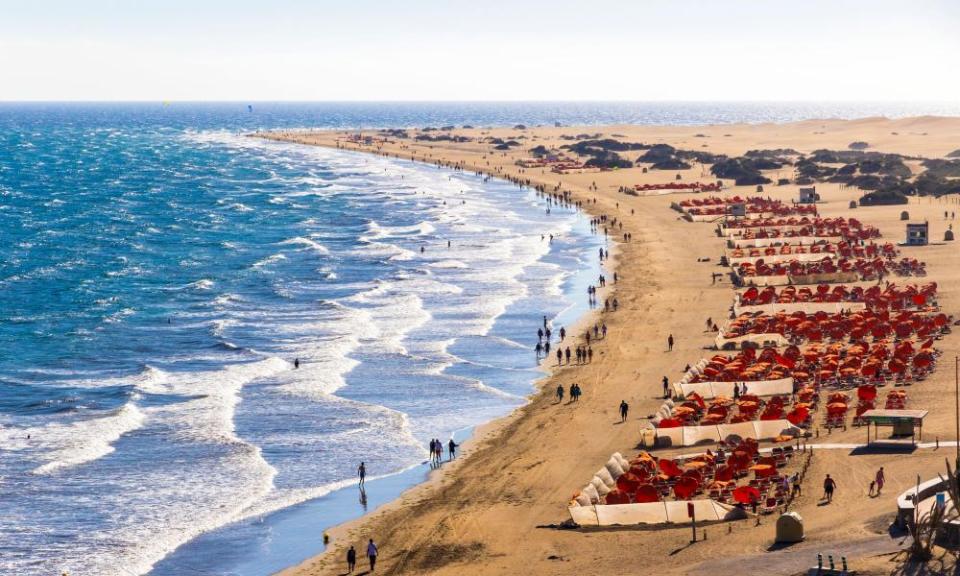Sales are soaring for Tui but the cost of living crisis could soon bite

Hundreds of flights delayed or cancelled, an engine fire on a Tui plane at Manchester airport, and an abject apology from the managing director … it has not been an easy summer for the world’s biggest tour operator.
On Wednesday, a Tui report on bookings and revenues from April to June will shine a light on the whole holiday sector during its peak period.
A surge in demand for travel has caused chaos at airports in the UK and elsewhere in Europe, as they struggled to recruit baggage handlers and security staff after massive layoffs during the Covid pandemic.
Tui insists that it has cancelled fewer flights than some of its rivals, including easyJet and British Airways, which have scrapped thousands in recent months. But UK boss Andrew Flintham issued an apology to customers in June and promised to learn its lessons. In July and August (so far), it has flown all scheduled flights and claims it takes nine days, on average, to issue refunds.
After the May half-term cancellations, Tui said bookings had slowed across the industry – not surprising given the chaotic scenes at airports – but it still expects sales this summer to be close to pre-pandemic levels. Brits are particularly eager to travel: by mid-May more of us had bought Tui holidays than in the same period in 2019.
Tui has lots to offer, but the drain on cash when you have planes and big hotels to fill is enormous
Sophie Lund-Yates, analyst
This summer, many families are taking their first trip abroad since the pandemic started. They are splashing out on longer trips, and upgrading to four- or five-star hotels and better rooms.
Spain, Greece, Turkey and Mexico are popular destinations, with an all-inclusive holiday in Mexico not costing much more than a break in Greece, Tui says.
Germans are also desperate to jet abroad, and summer travel bookings in Europe’s biggest economy are back at 2019 levels, or in some cases exceeding them, according to a recent poll by the data group GfK.
At Tui, second-quarter revenues mushroomed to €2.1bn from €250m a year earlier, as demand ramped back up. The group operated at 71% of pre-pandemic capacity in the period. Its hotels and resorts business delivered a third consecutive quarter of positive underlying operating profit since the start of the pandemic.
For cruises, the company is hoping for a recovery in the second half of the year; many ports were still closed earlier this year and its ships could sail only on limited routes.
Sophie Lund-Yates, equity analyst at Hargreaves Lansdown, says: “Tui doesn’t just run flights – it has a much wider package holiday business. In some ways that’s what makes Tui more defensive – it has more to offer and plenty of cross-selling opportunities. But getting capacity back up to full whack is also a much higher priority for it: the drains on cash when you have planes and huge hotels to fill are enormous.”
Like others in the holiday business, Tui faces challenges as the cost of living crisis bites and people rein in their spending. There is the potential for the company to do well in the future thanks to its more diverse offering, but analysts warn that further turbulence is likely for now.
After nine years at the helm, chief executive Fritz Joussen is to bow out at the end of September and hand over to Sebastian Ebel, Tui’s finance chief. He will have to steer the company through more turmoil, because the UK and Germany are likely to fall into long or deep recessions, mainly because of Russia’s war in Ukraine.
Britain is on course for a recession lasting more than a year and double-digit inflation, the Bank of England warned last week as it raised interest rates for a sixth successive time. “The world may soon be teetering on the edge of a global recession, only two years after the last one,” the International Monetary Fund’s chief economist, Pierre-Olivier Gourinchas, warned last month.
This summer holiday could be the last hurrah for many.

 Yahoo News
Yahoo News 